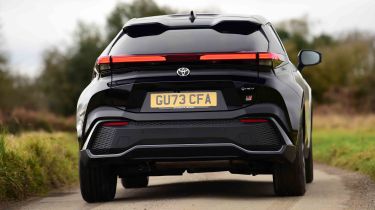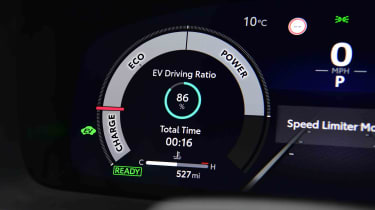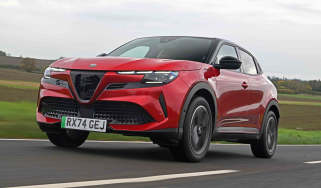Toyota C-HR - MPG, emissions & running costs
1.8 and 2.0-litre Hybrids compare well with petrol-only rivals, while PHEV should lure in more company car buyers

| Model | MPG | CO2 | Insurance group |
| Toyota C-HR 1.8 Hybrid Icon | 60.1mpg | 105g/km | 20 |
| Toyota C-HR 2.0 Hybrid GR Sport | 57.7mpg | 110g/km | 27 |
| Toyota C-HR 2.0 PHEV | 313.8mpg | 19g/km | 26 |
All of the engines in the C-HR line-up have hybrid technology, so when we discuss which version is thirstiest, it’ll still be far more frugal than rivals using only petrol power. Technically, the 2.0 Hybrid in GR Sport form is the least efficient version, managing ‘only’ 57.7mpg and 110g/km emissions. That’s still leagues ahead of the base 1.0-litre Hyundai Kona that averages nearly 10mpg less.
The 1.8 Hybrid is even better, with a combined WLTP economy figure of 60.1mpg (exactly the same as the equivalent Kona Hybrid) and emissions of 115g/km.
Based on our experience with hybrid cars, the fuel economy will improve in urban conditions, unlike a normal petrol, where the economy would suffer. It’s not uncommon for the car to report that it has spent more than 70 per cent of short journeys running on electric alone – and that’s with the powertrain left in Normal (rather than Eco) mode.
And, of course, you never have to plug in either the 1.8 or 2.0 Hybrid models – a major benefit to anyone looking to go electric but doesn’t have ready access to plug-in charging at home.
The C-HR Plug-In Hybrid PHEV does require you to plug it in (the clue’s in the name), and doing so regularly should see you achieve even better average fuel efficiency numbers – even if you’re unlikely to see anything close to the 313.8mpg combined number in the real world. CO2 emissions of just 19g/km are impressive, and mean low road tax costs, too.
Used - available now
The PHEV model defaults to its EV (all-electric) driving mode each time you start, and will use as much of the battery as it can before switching on the engine. You’ll need to select the EV/HV (hybrid) mode on longer drives because the car will then intelligently switch between electric and engine power by monitoring inputs such as driving style, navigation, and elevation data, boosting fuel efficiency across your whole trip.
Those commuting to a low-emission zone in a city centre will need the HV mode to maintain battery charge so that it can be used later for electric-only driving. Like most plug-in hybrids, there’s a special charge mode that uses engine power and regenerative braking to top up the battery.
Electric range, battery life and charge time
The plug-in model uses a 13.6kWh battery, which should provide up to 41 miles of electric-only driving. Replenishing a flat battery should take around 2.5 hours using a 7.4kW wallbox charger at home.
As standard, the hybrid battery in regular and plug-in hybrid models is covered by a separate warranty of up to five years/60,000 miles, but this can be extended by 12 months or 10,000 miles at a time after every service at a Toyota franchised dealer, up until the car is 10 years old or has covered 100,000 miles. After this point, you’ll need an annual hybrid battery service that’ll give you a further 12 months of hybrid battery warranty coverage until the car is 15 years old.
Tax
The C-HR Plug-In Hybrid will avoid the first year’s road fund licence fee, and its excellent electric-only range means that it’ll slip into a lower Benefit-in-Kind (BiK) tax band than the Renault Captur E-Tech PHEV or Cupra Formentor e-Hybrid. You will have to be careful which trim level you go for, though, because only the Design trim avoids the surcharge applied from the second time the vehicle is taxed (from years two to six) for cars that cost more than £40,000 when new.
Of the rest of the C-HR range, the 1.8-litre would be a better bet than the 2.0-litre. That’s because all trim levels using the 1.8-litre engine will cost less than £40,000 when new, whereas the GR Sport trim of the 2.0-litre is above that limit.
Insurance groups
The C-HR starts in insurance group 20 for the entry-level 1.8 Hybrid Icon, rising to group 22 for the 1.8 Hybrid Excel. The more powerful 2.0 Hybrid in GR Sport trim jumps to group 27.
Compared with other hybrid small SUVs, the C-HR will cost more to insure than the Kona, which is in group 16 for the 1.6 Hybrid Advance model. However, if you need something that’ll cost even less to insure, look at the entry-level SEAT Ateca 1.0 TSI SE, which is in group 10.
Check if your car needs an MoT and view its complete history with our MoT History Checker...
Depreciation
Residual values for the C-HR are likely to be good rather than outstanding. After three years and 36,000 miles, the C-HR will maintain between 46 and 53 per cent of its resale value, with the worst version being the 1.8 Hybrid Excel and the best version being the 2.0-litre Plug-In Hybrid GR Sport.
Our favourite small SUV, the Hyundai Kona, averages between 51-53 per cent over the same period, while the cheaper Volkswagen T-Cross is worth between 50-54 per cent over our same time frame.
To get an accurate valuation on a specific model, check out our valuation tool…
















